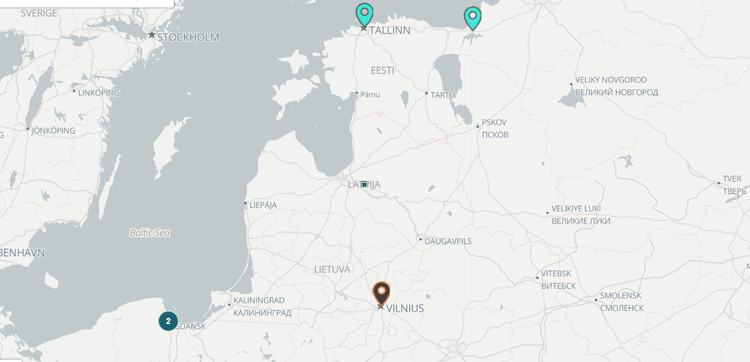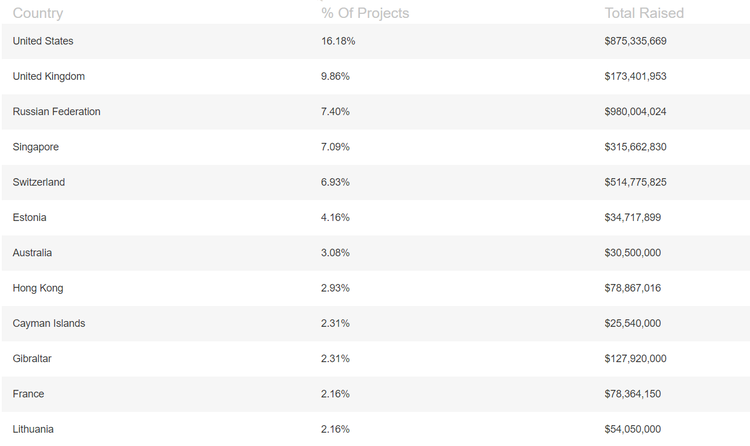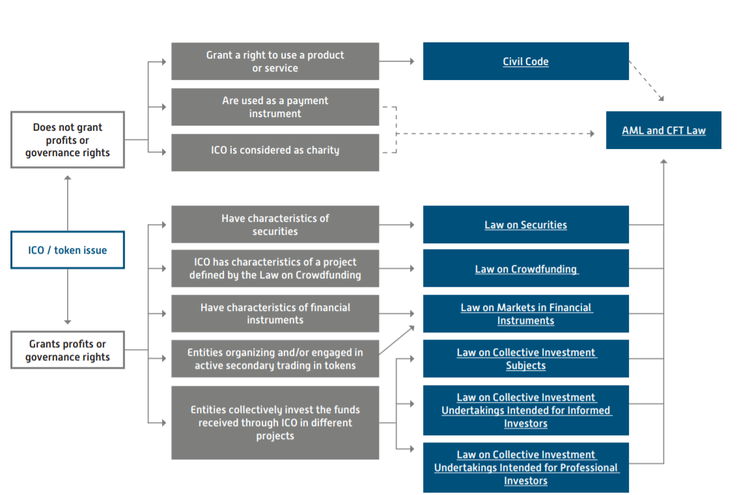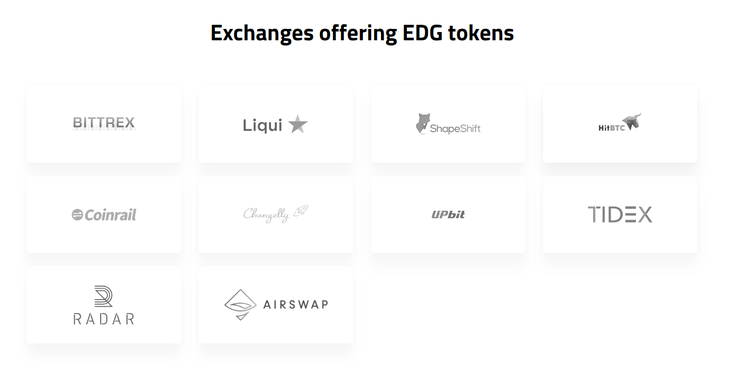One of the greatest things about cryptocurrency is that it gives nations a chance to compete on equal conditions. While the three Baltic states - Latvia, Lithuania and Estonia - may not be the largest economies in the world, but the region has become an important blockchain hub. While a number of countries are clamping down on cryptocurrency, the Baltic nations have chosen a different track.
Talking of the respectful capitals, according to Coinmap, 55 locations in Vilnius accept crypto payments. There are 21 and 26 venues in Riga and Tallin respectively. Bitcoin ATMs can be found in the capitals of Estonia and Lithuania, according to Coinatmradar.
Data from ICO Watch List indicates that Estonia is ranked six in the world for the number of ICOs conducted. It homes 4.16% of the total number of ICOs. Lithuania is 12 on the list.
Last November, the Ministries of Finance of all three countries came together to form a Memorandum of Understanding to pledge support for blockchain innovation. Under the document the parties agreed to support “the development of capital market innovations and new technologies with a consideration for regional FinTech solutions, e.g. distributed ledger technology.” Earlier this year Lithuania’s Ministry of Foreign Affairs issued ICO guidelines, claiming its a “step towards more certainty and transparency in the regulatory, taxation, accounting and other requirements as well as better cooperation between different stakeholders.”
The Minister of Finance, Vilius Šapoka, said the development of new financial instruments and phenomenon of blockchain technology cannot be ignored and voiced conviction that in certain cases, such as ICOs, it should be regulated.
“We acknowledge that the brave new crypto economy world is here to stay, this is why we encourage and invite its participants to innovate and create in Lithuania,” the Minister added.
The guidelines cover the following four areas: regulation, taxation, accounting, and Anti-Money Laundering / Combating the Financing of Terrorism (AML/CFT). The document outlines various scenarios that would classify an ICO as a security or currency. The Ministry further provides additional regulations that would apply under each category.
Taxation section outlines the treatment of cryptocurrency for different tax purposes, as well as tax exemptions and deductions. Retail investors who receive income from individual purchases and sales of virtual currencies will be taxed s standard 15% fixed income tax rate. Founders of ICOs will not be taxed if the tokens are not active or locked, or if they are held for dividend or interest payments to investors. Mining of virtual currency and the sale of such currency will be exempt from VAT.
The Latvian government, in turn has unveiled different initiatives to support startups. The startup law and startup visa, making it easier for innovative startups to initiate blockchain and crypto-based projects. As early as July 2014, Latvia’s nationally owned airline, AirBaltic, started accepting crypto payments. It became the world’s first airline to accept Bitcoin as payment for its tickets to 60 destinations in Europe, Middle East, Russia and the CIS. The airline teamed up with Bitpay, a third-party payment processor that converts Bitcoins into Euros.
Latvia also became the first Baltic country to accept crypto payments for real estate. According to Freedman Club Crypto News, the Latvian branch of the Baltic Sotheby’s International Realty is interested in accepting cryptocurrency as payment. The company offers its customers a unique opportunity to transform their virtual currency into real high-end real estate. There are cars being sold for Bitcoin on the ss.lv website, while the city.lv real estate website sells housing for the cryptocurrency.
In the first week of April 2018, Latvia’s Ministry of Finance outlined its views on cryptocurrency transactions during a meeting with Members of Parliament. The Ministry’s representatives proposed a 20 percent tax on capital gains from cryptocurrency investments while maintaining that digital currencies are risky investment vehicles.
In Estonia cryptocurrencies are not subjected to VAT. Any startup willing to get incorporated in Estonia, only has to pay normal business taxes. ICOs are not subject to VAT and income taxes, either. Only cryptocurrency exchanges in the country are regulated.
Estonia had long been rumored to be preparing to launch a national cryptocurrency dubbed Estcoin. However, a government spokesman said in June this year the Baltic nation was not looking to issue its own national cryptocurrency as it already uses the euro as its official currency. Instead, he said, Estonia plans to explore possibilities for blockchain technology and the use of crypto tokens within its "e-residency" program, which gives both Estonians and foreigners a digital form of identification.
In Estonia companies that deal with virtual currencies can apply for two different activity licenses: providers of a service of exchanging a virtual currency against a fiat currency and Providers of a virtual currency wallet service. Both licenses are issued by the Financial Intelligence Unit (FIU). They can be applied separately one by one or together. When applied together, two applications must be submitted, and two different licenses are issued.
Starting a crypto company in Estonia looks attractive, as the country imposes no limit on the amount of cryptocurrency investments. Incorporation and registration is conducted online in a process that takes less than an hour, and costs under €5,000 to start a limited liability company. Furthermore, investors from any part of the world are welcome.
*_Below are some of the blockchain and crypto companies operating in the Baltic states:_ *
Hodl Hodl is a Riga-based P2P cryptocurrency exchange that allows users to trade directly with each other without holding on to user’s funds. All trades occur directly between buyers and sellers without a middleman.
Founded in 2017 by Dmitry Dementyev-Dedelis and Normunds Kvilis, DigiPulse ensures that all digital assets-holders and crypto-wallet users have ultimate control over who inherits their assets. Should anything happen to the user or the device, an automated system will send digital assets to the recipients of choice without involving any third parties.
Power Mining was founded in 2017 by Kristaps Mors and Janis Grinbergs to build their own crypto mining farm, and also help others to buy and host mining hardware. The Power Mining shop offers bitcoin, litecoin miners as well as parts to build ethereum and other mining rigs.
Headquartered in Vilnius, Lithuania, Sola is a decentralized social platform governed by users. Users create, spread and earn on their information in a fair and transparent way. Anyone is free to contribute to the core platform development, or to build services on top of it.
WePower is a blockchain-based green energy trading platform in Lithuania. It fuels renewable energy production by enabling developers to raise capital by selling their energy production upfront in the form of tradable Smart Energy Contracts. The project raised $40 million in an ICO.
Edgeless is the first ethereum ‘smart-contract’ powered casino, which offers zero edge for its players. EDG token, an ethereum-based ERC20 protocol token is used to play Edgeless casino games.
GuardTime is the world’s largest blockchain platform company by revenue, headcount and actual customer deployments. The company was launched in 2007 with the goal of creating a formally verifiable security system for the Estonian Government i.e. eliminating third parties, trusted insiders or cryptographic keys in the verification of the integrity of government records, networks and systems.
Kaizern is a web performance, security and blockchain development-based company with offices in New York and Tallinn. The Kaizern team has built multiple wallets, exchange and peer to peer marketplace.
Mothership is a cryptocurrency exchange that enjoy support from the Estonian government. A Fiat to Crypto License application is pending with Estonian Financial Authorities. The platform is expected to be integrated with the Estonian eResidency cards soon.








